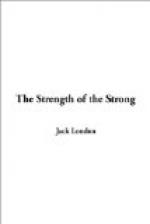“The Samuels,” Clara interpolated, with what I suspected was a giggle.
She was Mrs. Ross’s daughter, a strapping young woman with handsome features and remarkably handsome black eyes.
“‘Tuz naught to be smuckerun’ ot,” her mother reproved her.
“The Samuels?” I intervened. “I don’t understand.”
“Her four sons thot died.”
“And were they all named Samuel?”
“Aye.”
“Strange,” I commented in the lagging silence.
“Very strange,” Mrs. Ross affirmed, proceeding stolidly with the knitting of the woollen singlet on her knees—one of the countless under-garments that she interminably knitted for her skipper sons.
“And it was only the Samuels that died?” I queried, in further attempt.
“The others luved,” was the answer. “A fine fomuly—no finer on the island. No better lods ever sailed out of Island McGill. The munuster held them up oz models tull pottern after. Nor was ever a whusper breathed again’ the girls.”
“But why is she left alone now in her old age?” I persisted. “Why don’t her own flesh and blood look after her? Why does she live alone? Don’t they ever go to see her or care for her?”
“Never a one un twenty years an’ more now. She fetched ut on tull herself. She drove them from the house just oz she drove old Tom Henan, thot was her husband, tull hus death.”
“Drink?” I ventured.
Mrs. Ross shook her head scornfully, as if drink was a weakness beneath the weakest of Island McGill.
A long pause followed, during which Mrs. Ross knitted stolidly on, only nodding permission when Clara’s young man, mate on one of the Shire Line sailing ships, came to walk out with her. I studied the half-dozen ostrich eggs, hanging in the corner against the wall like a cluster of some monstrous fruit. On each shell were painted precipitous and impossible seas through which full-rigged ships foamed with a lack of perspective only equalled by their sharp technical perfection. On the mantelpiece stood two large pearl shells, obviously a pair, intricately carved by the patient hands of New Caledonian convicts. In the centre of the mantel was a stuffed bird-of-paradise, while about the room were scattered gorgeous shells from the southern seas, delicate sprays of coral sprouting from barnacled pi-pi shells and cased in glass, assegais from South Africa, stone axes from New Guinea, huge Alaskan tobacco-pouches beaded with heraldic totem designs, a boomerang from Australia, divers ships in glass bottles, a cannibal kai-kai bowl from the Marquesas, and fragile cabinets from China and the Indies and inlaid with mother-of-pearl and precious woods.
I gazed at this varied trove brought home by sailor sons, and pondered the mystery of Margaret Henan, who had driven her husband to his death and been forsaken by all her kin. It was not the drink. Then what was it?—some shocking cruelty? some amazing infidelity? or some fearful, old-world peasant-crime?




